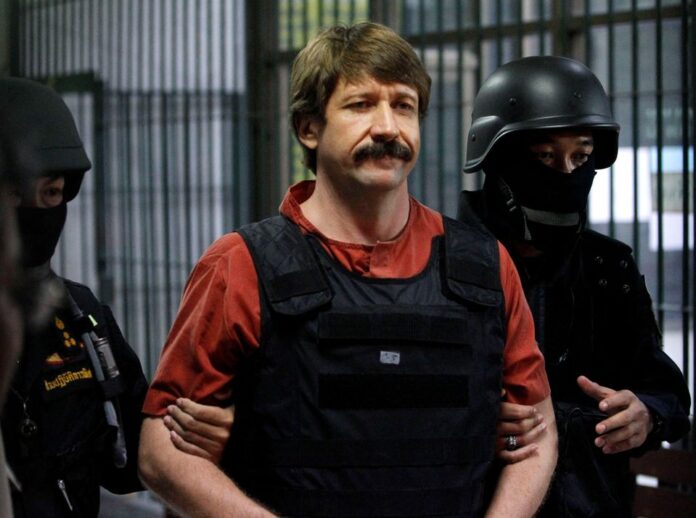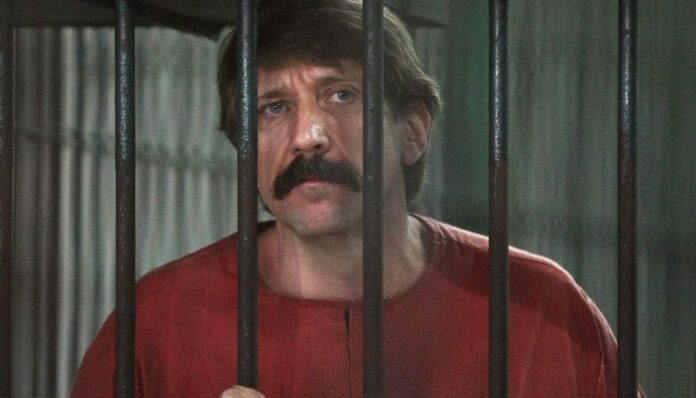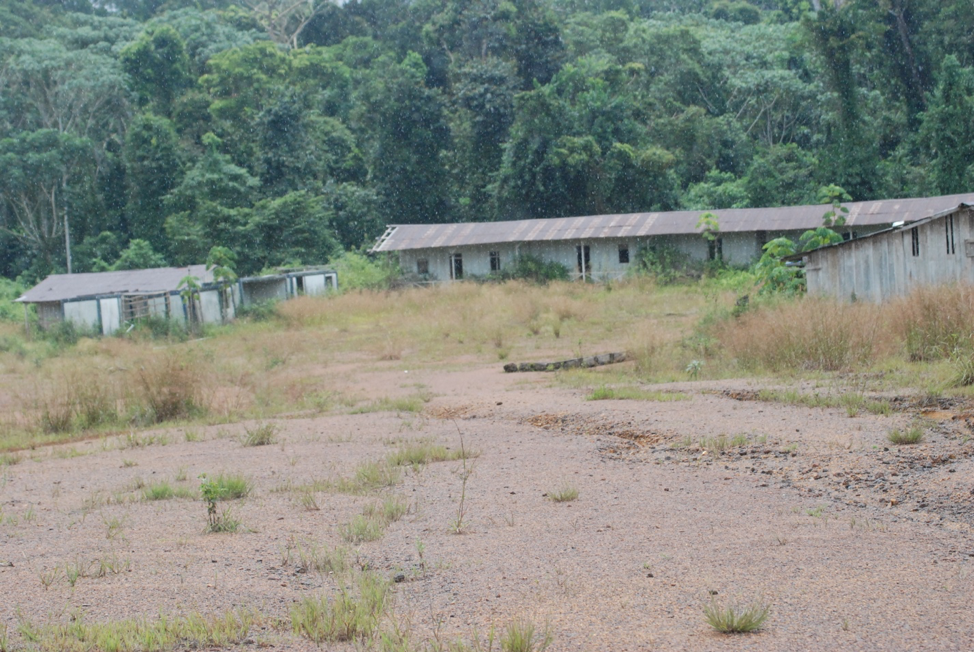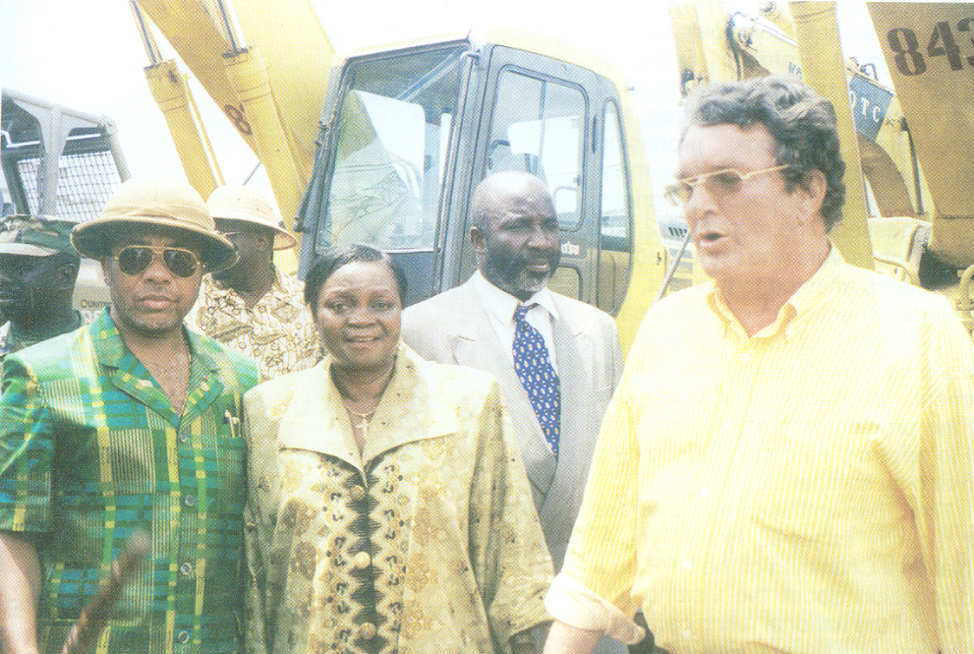Top: Viktor Bout being led by US security officers. Reuters/Sukree Sukplang
By James Harding Giahyue
MONROVIA – The United States has released Viktor Bout, the notorious arms dealer who sold weapons to warring factions in Liberia’s civil wars in exchange for the country’s timber. His release was part of a long-proposed prisoner swap deal between Washington and Moscow that saw the latter freed Brittney Griner, the American basketball player who was serving a nine-year sentence by a court in Moscow for possessing and smuggling drugs.
“I’m glad to say Brittney’s in good spirits… she needs time and space to recover,” President Joe Biden told reporters at the White House on Thursday following.
Russian state media showed footage of Bout and Griner passing each other at the airport alongside their respective teams crossing on the tarmac with their respective teams. Bout greets Russian officials while Griner looks on.
“The Russian citizen has been returned to his homeland,” the Russian foreign ministry statement said.
Between 1989 and 2003, Bout sold weapons to Liberian warring factions—most notably former President Charles Taylor—busting several United Nations arms embargoes. Within that time, Taylor’s forces and rivals illegally exploited the country’s timber and mineral industries to buy Bout’s weapons. Some 250,000 people were killed in the conflict, destroying Liberia’s forest. As the result, the country became synonymous with “logs of war” and “conflict timber.”
Liberia’s Truth and Reconciliation Commission (TRC) recommended in 2009 that Bout be investigated for his role in the country’s crises but this is yet to happen more than a decade on. And his release has made that possibility even slimmer.
“Even though he spent time in jail, through the effort of the US justice system, we do not think he deserves to be a free man,” said Hassan Bility, the executive director of Global Justice and Research Project (GJRP), an NGO that has helped to prosecute Liberian war criminals Alieu Kosiah and Kunti Kamara, and United States immigration fraudsters Mohammed Jabbateh and the late Thomas Woewiyu whose crimes were linked to the country’s civil wars.
“Bout’s business deals and his thirst for profits led to the murder of tens of thousands of Liberians. And what do the victims get in return?” Bility said.
Critics of the Bout-for-Griner swap were unfair as the Russian’s crimes were way graver than the American’s offense. While Bout was convicted of wire fraud, money laundering and the illegal purchase of an aircraft, Griner was held for being in possession of a cannabis-laced ointment.
Michael McCaul, the top Republican on the US House of Representatives foreign affairs committee, said in the Guardian, “Trading Viktor Bout, a dangerous convicted arms dealer who was in prison for conspiring to kill Americans, will only embolden Vladimir Putin to continue his evil practice of taking innocent Americans hostage for use as political pawns.”
Stephen Rapp, former chief prosecutor for the United Nations-backed Special Court for Sierra Leone, said there was still something to celebrate.
“I am pleased that Britney Griner has now been freed. I would have preferred that this could have happened without the release of the notorious arms dealer Victor Bout,” Rapp told The DayLight. “I take some solace in the fact that Bout was in jail for almost 15 years since his arrest in Thailand in March 2008. I am sure that many were saved from death and injury from the use of the arms that he would have traded to violent groups around the world.
‘The Merchant of Death’
Bout was active in Afghanistan, Colombia, Angola, the former Yugoslavia, Yemen, Somalia and the Democratic Republic of Congo. But it was his deals with Taylor that capped the former Soviet soldier’s career as the world’s most notorious arms trafficker.
While Bout busted arms embargos to supply Taylor with arms and ammunition in Liberia, Taylor illegally exploited the country’s logs and minerals and abused its huge shipping registry—the second-largest in the world—to pay Bout. The two men met personally, according to eyewitnesses cited by American journalists
Douglas Farah and Stephen Braun in their 2007 book “Merchant of Death: Money, Guns, Planes and the Man Who Makes War Possible.”
Earning other aliases: “Sanctions-buster,” “Lord of War” and “The McDonald’s of Armed Trafficking,” Bout broke a number of United Nations arms embargos on Liberia between 1992 and 2003. His fleet of ships and airplanes transported the weapons to Liberia, using different pseudonyms and shell companies, transiting through countries like Gambia, Chad, Burkina Faso, Cote d’Ivoire and Niger.
In 2003, the Liberia United for Reconciliation and Democracy (LURD), which had launched its rebellion against Taylor in 1999, attacked the capital. With American President George W. Bush stating he “must leave Liberia” and Nigerian president Olusegun Obasanjo offering him exile, Taylor resigned in August 2003. And that marked the end of 14 years of civil unrest.
In 2004, Bout and Taylor were subjected to UN and U.S. sanctions, a travel ban and assets seizure, similar to the one placed on three officials of the current Liberian government. It took more than a decade for the asset freeze and travel ban to be lifted.
Bout moved on with his illegal arms deals after Taylor’s fall from power, surviving an International Criminal Police Organization or Interpol notice, and forgery charges in the Central African Republic. In July 2004, Bush issued an executive order, freezing the assets of Bout, Taylor, Taylor’s relatives and some members of the Liberian government. Taylor’s ex-wife and now Vice President of Liberia Jewel Howard Taylor, and opposition figure Benoni Urey were subject to the measure. The assets freeze followed a similar one by the UN Security Council earlier that year.
Bout ignored the sanctions. In 2008, he was arrested in an Interpol operation in Bangkok, Thailand. Bout had offered to supply weapons to rebels of the Revolutionary Armed Forces of Colombia (FARC). It turned out the rebels were actually officers of the U.S. Drug Enforcement Agency (DEA) and the Royal Thai Police.
Initially, American prosecutors charged him with conspiracy to kill U.S. nationals, conspiracy to kill US officers and employees and conspiracy to provide surface-to-air missiles and other weapons to a foreign terrorist organization. But while the U.S. Justice Department pressed for Bout’s extradition from Thailand to America, prosecutors happened upon a new development. Bout had been negotiating to buy a plane on U.S. soil, which violated the sanctions Washington imposed on him and Taylor. Additional charges were filed against him: illegal purchase of aircraft, wire fraud and money laundering. He was convicted by a New York court in 2012 and sentenced to 25 years in prison, 15 years of supervised parole and forfeiture of US$15 million. The court dismissed his initial charges, saying they only originated from the deceptive operation that led to his arrest.
That, perhaps, closed the chapter on the career of the world’s most infamous arms trafficker, born Viktor Anatolyevich Bout on January 13, 1967, in the former Soviet Union now Tajikistan.
Also, Read




